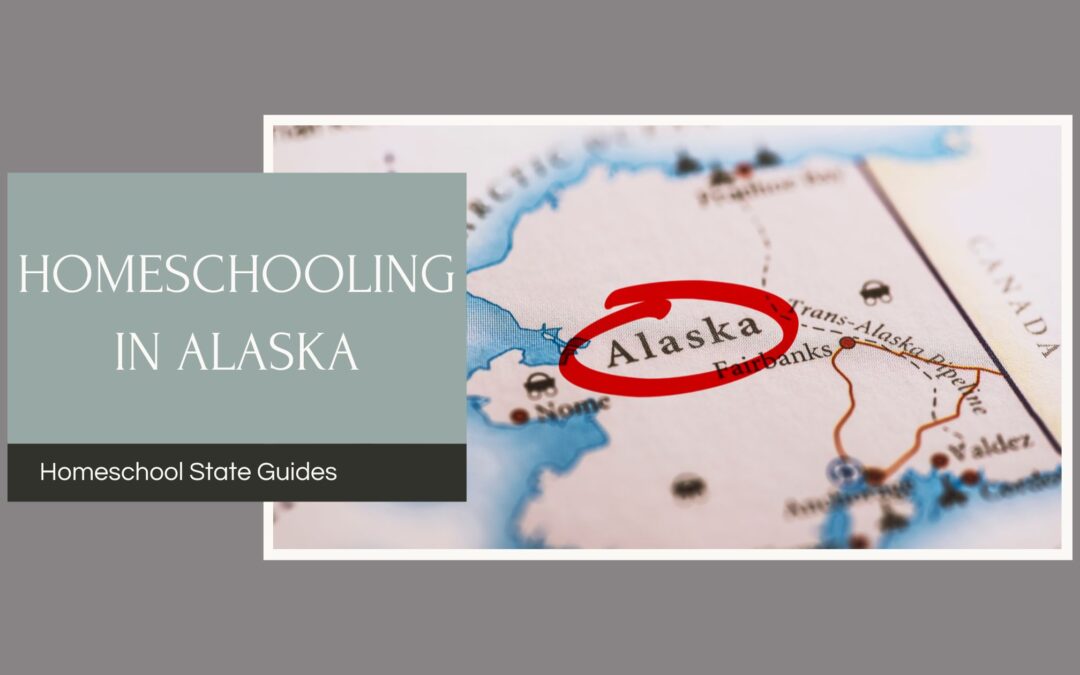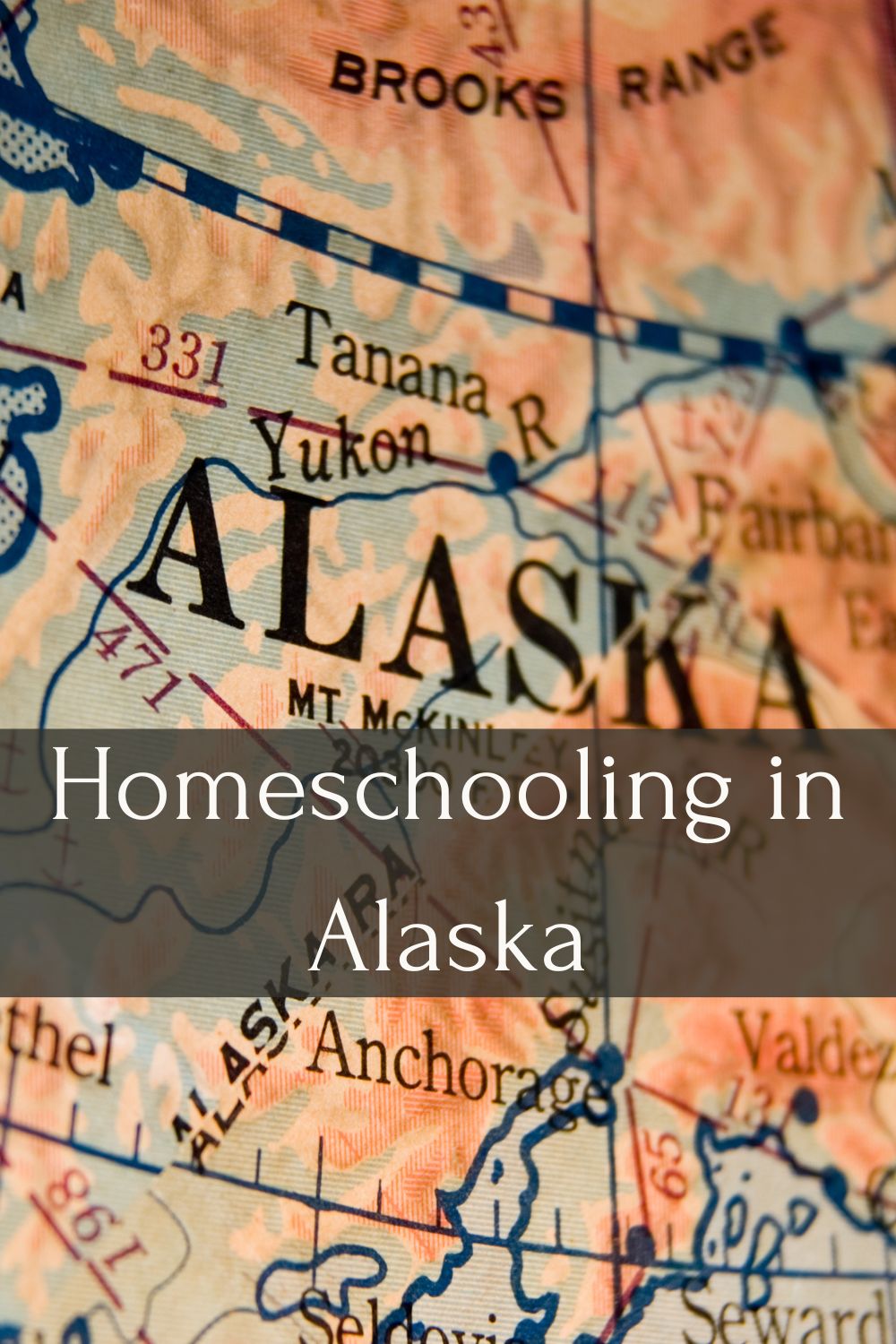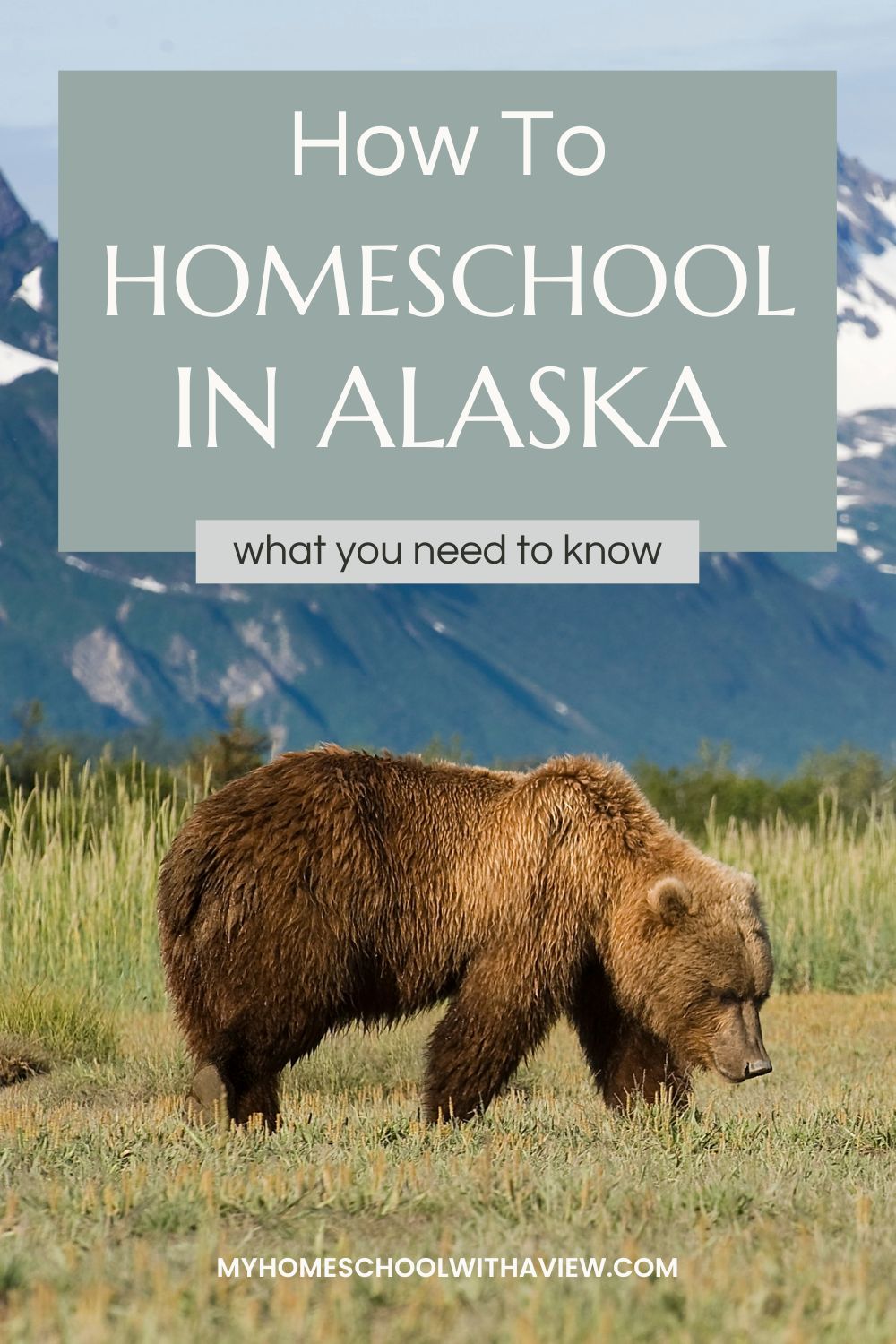This post is all about homeschooling in alaska.
Alaska’s wilderness landscapes and unique culture provide a rich backdrop for education, and many great opportunities for those interested in homeschooling in Alaska.
For many families homeschooling in Alaska, the Last Frontier offers the flexibility to tailor education to their children’s needs while integrating the unique experiences Alaska has to offer.
As a teen, I spent three years living and homeschooling in Kodiak as my dad was stationed there with the US Coast Guard. The freedom and independence I experienced living in Alaska is unmatched. Homeschooling in Alaska offered me so many opportunities (like traveling overseas) that I wouldn’t have otherwise experienced.
Alaska homeschool laws are some of the best for recognizing the role and right of parents homeschooling in Alaska.
Even though homeschooling in Alaska is an amazing option, it is still important to know and understand how to homeschool in Alaska.
Navigating the homeschool laws in Alaska is crucial for ensuring compliance and making the most of your homeschool adventure.
In this post you will learn about homeschooling in Alaska, Alaska homeschool resources, homeschooling laws in Alaska, and graduation requirements for high schoolers homeschooling in Alaska.
Important: None of the information in this post is to be taken as legal advice. It is important for each homeschooling parent to read, understand, and comply with the homeschool laws of their state.
Understanding Options for Homeschooling in Alaska
Alaska is known for its lenient homeschool laws, providing parents with several options to educate their children at home. These options include:
- Homeschooling Under the Homeschool Statute: Parents can homeschool their children without notifying the state or obtaining approval. This option offers maximum flexibility, allowing parents to design their curriculum and teaching methods.
- Homeschooling Through a Correspondence Program: Many families opt for enrolling their children in a public correspondence program or a virtual school. These programs often provide curriculum resources, support services, and sometimes even financial aid for educational materials.
- Homeschooling with a Private Tutor: This option allows families to be homeschooled by an Alaska certified teacher.
- Homeschooling as a Religious Private School: This option involves establishing a religious private school and has the most requirements.
Alaska Homeschool Laws: Key Legal Requirements
1. Homeschool Statute (Alaska Statute 14.30.010(b)(12))
- Notification: No notification is required to start homeschooling.
- Qualifications: Parents do not need specific qualifications to homeschool their children.
- Assessments: There are no mandatory standardized tests or assessments for homeschool students.
- Record-Keeping: While not required, keeping records of the child’s progress, curriculum used, and samples of work is recommended for personal tracking and future reference.
2. Correspondence Programs
- Enrollment: Students must be enrolled in a recognized public or private correspondence program.
- Reporting: Regular reporting on student progress may be required, depending on the program.
- Support and Resources: These programs often provide access to certified teachers, curriculum materials, and financial support for educational resources.
3. Private Tutor Option (Alaska Statute 14.30.010(b)(12))
- Tutor Qualifications: The tutor must be a certified teacher in the state of Alaska.
- Curriculum and Instruction: The curriculum and instructional methods are set by the parents in collaboration with the tutor, ensuring that essential subjects are covered.
- Instructional Hours: There are no specific state-mandated instructional hours, but a regular and consistent schedule is advisable to ensure comprehensive learning.
- Record-Keeping: Maintaining some records of instructional hours, subjects covered, and the student’s progress is recommended, even though it’s not explicitly required by the state
4. Private School Option (Alaska Statute 14.45.100)
- Annual Report: Parents must file an annual report with the Alaska Department of Education detailing enrollment information.
- Attendance: The private school must comply with the state’s attendance requirements, ensuring students are engaged in educational activities for a minimum number of days per year.
- Instructional Time: The state mandates specific instructional hours, typically 180 days per year.
- Curriculum: Parents have the freedom to choose their curriculum but must ensure it covers essential subjects like math, reading, science, and social studies.
Compulsory Attendance Requirements for Alaska Homeschooling
In Alaska, homeschooling families must comply with the state’s compulsory attendance laws, which apply to all school-aged children, including those who are homeschooled. Here’s a detailed overview of the compulsory attendance requirements for homeschoolers in Alaska:
Compulsory Attendance Age in Alaska
- Age Range: Children between the ages of 7 and 16 are subject to compulsory attendance laws in Alaska.
Alaska Homeschool Requirements for Attendence
- Homeschool Statute (Alaska Statute 14.30.010(b)(12))
- Attendance Requirements: There are no specific attendance requirements under this option. Parents have full discretion over their child’s schedule and educational activities.
- Correspondence Programs
- Attendance Requirements: Students enrolled in public or private correspondence programs must adhere to the attendance policies set by the program, which generally align with the public school calendar and requirements.
- Private Tutor Option (Alaska Statute 14.30.010(b)(12))
- Instructional Hours: There are no specific state-mandated instructional hours, but a regular and consistent schedule is advisable to ensure comprehensive learning.
- Private School Option (Alaska Statute 14.45.100)
- Attendance Requirements: If homeschooling as a private school, parents must comply with state attendance requirements, typically ensuring that students participate in educational activities for a minimum of 180 days per year.
Key Points for Alaska Homeschool Compliance
- Instructional Days: While homeschooling under the homeschool statute does not mandate a specific number of instructional days, maintaining a regular and consistent educational schedule is advisable to ensure comprehensive learning.
- Flexibility: Alaska’s homeschooling laws provide significant flexibility, allowing parents to create an exciting homeschool adventure. The freedom creates space for accommodating different learning paces and integrating experiential learning opportunities unique to Alaska.
- Record Keeping: Regardless of the option chosen, I always recommend keeping a minimum of attendance records and a year end summary of what was learned (you can see an example of my summary in this post).
Homeschool High School Graduation Requirements in Alaska
In Alaska, homeschool students do not have a specific set of state-mandated graduation requirements. Instead, parents have the flexibility to set their own graduation criteria.
It is important to consider what your high schooler wants to do post-graduation when setting your own graduation requirements. Find the requirements of the college, university, trade school or employer that your student would like to attend, and set your high school plan around that.
Issuing a Homeschool Diploma in Alaska
As a homeschooling parent in Alaska, you have the authority to issue a high school diploma once your child has met the graduation requirements you have set. This diploma is recognized and signifies that your student has completed their high school education.
How to Homeschool in Alaska
Benefits of Homeschooling in Alaska
Alaska’s homeschooling laws are designed to offer flexibility and freedom, allowing parents to create an education plan that best suits their children’s needs. Here are some benefits:
- Personalized Education: Tailor the curriculum to match your child’s learning pace and interests.
- Experiential Learning: Incorporate Alaska’s natural environment into your studies with activities like wildlife observation, hiking, and visits to historical sites.
- Community Resources: Access a wide range of resources, including libraries, museums, and homeschooling networks for support and enrichment activities.
Challenges and Considerations
While homeschooling in Alaska provides numerous advantages, it also comes with challenges:
- Isolation: Due to Alaska’s remote areas, some families might feel isolated. Joining local homeschool groups or online communities can help mitigate this.
- Resources: Gathering educational resources and materials can be more challenging in remote locations. Utilizing correspondence programs can help bridge this gap.
- Regulatory Changes: Staying informed about any changes in state laws or regulations regarding homeschooling is essential for compliance and making the most of available opportunities.
Setting Up Your Homeschool
1. Determine Your Homeschooling Approach
Before you start, it’s important to determine which homeschooling option best suits your family’s needs. Consider factors such as your homeschool style, the level of structure you prefer, and the resources available in your community.
2. Research and Select Curriculum
Choosing the right curriculum is a critical step. In Alaska, you have the freedom to select or design a curriculum that aligns with your child’s learning style and educational goals.
3. Join Homeschooling Communities
Connecting with other homeschooling families can provide support, resources, and social opportunities for both parents and children. Local homeschooling groups and online communities are great places to start.
4. Plan a Schedule
Develop a daily or weekly schedule that incorporates not only academic subjects but also extracurricular activities, physical education, and field trips. Flexibility is one of the key advantages of homeschooling, so feel free to adjust the schedule as needed.
Utilizing Alaska’s Natural Resources for Homeschooling
One of the unique advantages of homeschooling in Alaska is the ability to incorporate the state’s natural beauty and resources into your educational plan. Here are a few ideas:
- Outdoor Education: Use Alaska’s wilderness as a classroom. Plan lessons around local wildlife, plant life, and geological formations. Activities like hiking, fishing, and bird watching can be both educational and enjoyable.
- Cultural Studies: Integrate Alaska’s rich cultural history into your curriculum. Study the traditions and histories of Alaska’s indigenous peoples, visit cultural heritage centers, and participate in local cultural events.
- Environmental Science: With Alaska’s diverse ecosystems, you have a unique opportunity to teach environmental science firsthand. Explore topics such as conservation, climate change, and sustainable living practices.
Record Keeping and Assessment
While Alaska does not require formal assessments for homeschoolers, keeping records is beneficial for tracking progress and ensuring a comprehensive education. Here are some options you can choose for effective record keeping:
- Daily Logs: Maintain a daily log of activities and lessons covered. This can help you stay organized and provide a clear overview of what has been accomplished.
- Portfolios: Create a portfolio of your child’s work, including samples of assignments, projects, and tests. This serves as a tangible record of their progress and achievements.
- Progress Reports: Periodically write progress reports summarizing your child’s development in various subjects. This can be a useful tool for reflecting on what’s working and what might need adjustment.
- Standardized Tests: While not required, some parents choose to administer standardized tests to gauge their child’s progress and identify any areas needing
Alaska Homeschool Resources and Support
Homeschooling in Alaska is made easier and more enriching with the wealth of resources and support available to families. Whether you are just starting out or looking for ways to enhance your homeschooling journey, there are numerous organizations, groups, and resources that can assist you.
Alaska Private and Home Educators Association (APHEA)
- Description: APHEA is a non-profit organization dedicated to supporting homeschool families across Alaska. They provide resources, advocacy, and networking opportunities.
- Services: Annual homeschooling conference, support groups, legal information, and resources.
- Website: APHEA
IDEA Homeschool
- Description: IDEA is a statewide correspondence program offering support to homeschool families in Alaska.
- Services: Certified teacher support, curriculum resources, financial allotments for educational materials, and standardized testing options.
- Website: IDEA Homeschool
Alaska State Library
- Description: The state library offers a variety of educational resources that can be utilized by homeschool families.
- Services: Online databases, digital collections, and access to educational materials.
- Website: Alaska State Library
Frequently Asked Questions for Homeschooling in Alaska
- Do I need to notify the state if I start homeschooling in Alaska?
No, if you choose to homeschool under the homeschool statute, you do not need to notify the state or obtain approval. However, if you are homeschooling through a private school or correspondence program, different requirements may apply.
- Are there specific qualifications required for parents to homeschool in Alaska?
No, Alaska does not require parents to have specific qualifications or certifications to homeschool their children.
- Do homeschooled children in Alaska have to take standardized tests?
No, there is no requirement for standardized testing under the homeschool statute. However, some correspondence programs may have their own assessment requirements.
- What are the attendance requirements for homeschooling in Alaska?
If you are homeschooling under the homeschool statute, there are no specific attendance requirements. However, private schools must comply with state attendance requirements, typically 180 days per year.
This post is all about homeschooling in Alaska.
Other Posts You May Like:
Everything You Need To Know About Traditional Homeschooling (myhomeschoolwithaview.com)
Make Nature Study A Part of Your Homeschool – My Homeschool with a View
The Most Comprehensive Guide to Charlotte Mason Curriculum – My Homeschool with a View



